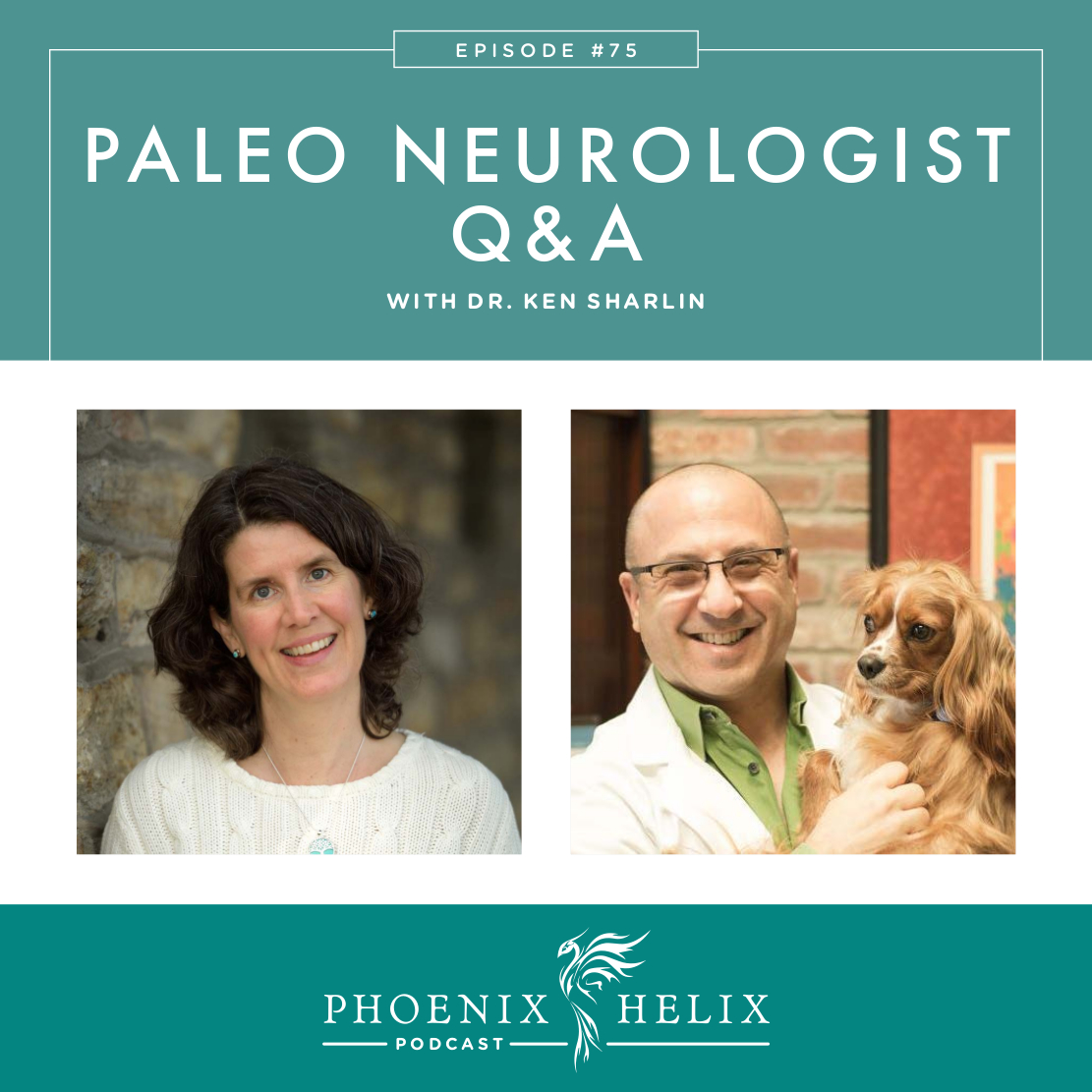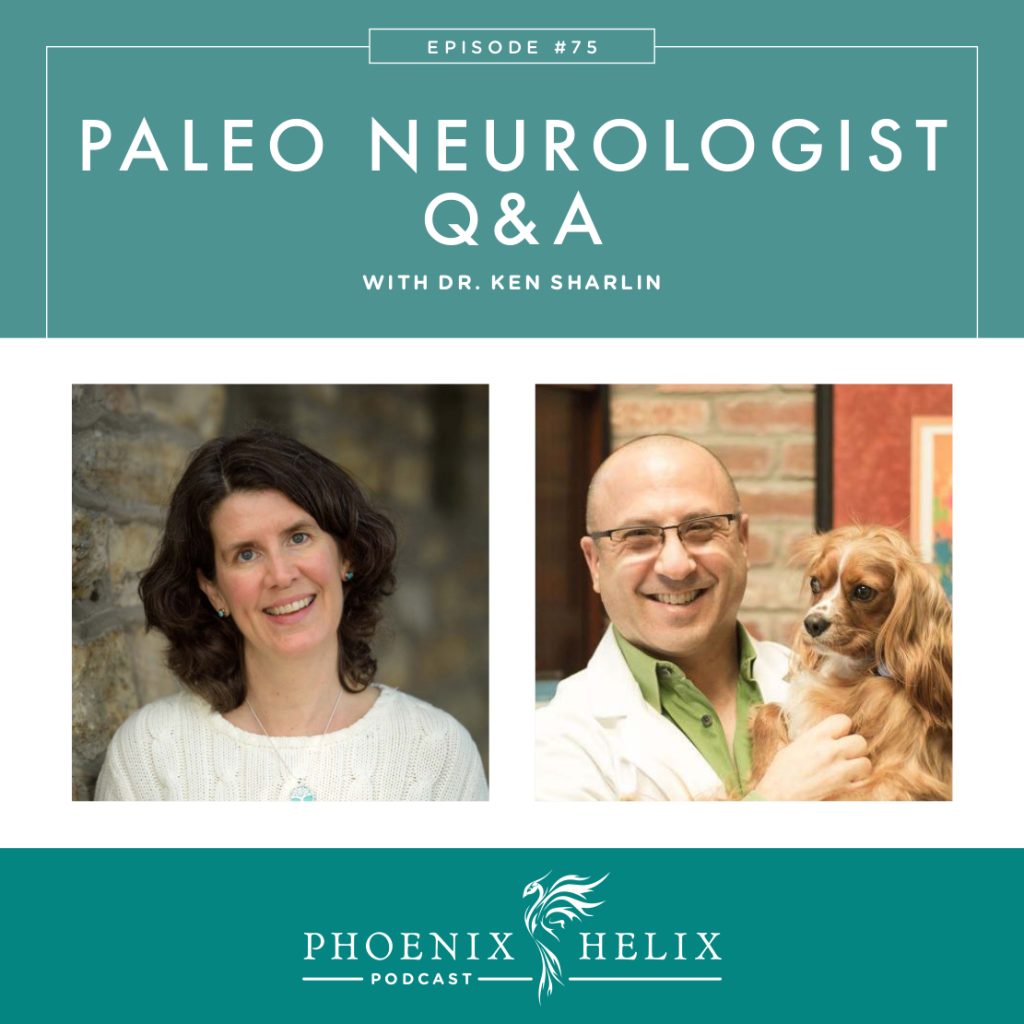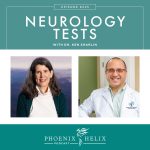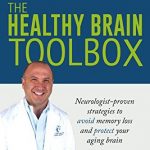What Is a Paleo Neurologist?
One of the most popular articles on my blog is a list of autoimmune specialist MD’s who are also paleo-friendly. The list is pretty short actually, because most doctors don’t believe that diet has any impact on autoimmune disease. When you find a medical doctor that treats their patients holistically, it’s like a dream come true. Dr. Ken Sharlin believes in the power of a nutrient-dense paleo diet and lifestyle. He also applies functional medicine principles in his practice, and he understands the pros and cons of medication – when they might be needed, and when they can safely be reduced or eliminated. Dr. Sharlin practices in Ozark, Missouri. In this podcast, he shares his treatment philosophy for neurological autoimmune disease.
Listen to the Show
- Subscribe to my podcast through your favorite podcast app: iTunes, Stitcher, Google, TuneIn, Spotify, Amazon, etc.
- You can also listen to the episode right here through the player below, and if you subscribe to my newsletter you’ll get notified of future episodes.
Podcast: Play in new window | Download
Show Notes
- Intro (0:00)
- Eileen’s Updates (1:52)
- I recently returned from a road trip to visit family. If you follow me on social media, I shared photos of my travel food on Instagram and Facebook. You can also check out my Paleo AIP Travel Series of articles and podcasts here on my blog for tips on staying healthy away from home.
- On the weeks between podcasts, I write articles on my blog. If you don’t want to miss out, subscribe to my weekly newsletter.
- Thank You to Our Podcast Sponsor – Paleo on the Go (2:43)
- A frozen meal delivery service, they have a large menu of items for the paleo autoimmune protocol (AIP).
- Use the code PHOENIX for 10% off your first order.
- Meet Dr. Sharlin (3:40)
- Dr. Ken Sharlin is a board-certified neurologist who has been in professional practice for 19 years. With an equal love for writing and medicine, he was inspired to become a neurologist by physician-author, Oliver Sacks. He approaches medicine as an art.
- His interest in functional medicine actually stemmed from his own health journey – changing his diet and lifestyle to support his body as a cyclist and triathlete. At the same time, he was becoming disillusioned with the limited results he achieved with his patients through conventional medicine. He felt a disconnect between his personal and professional life, and that’s when he learned about the Institute for Functional Medicine. He is now the only IFM-certified neurologist in the world with an active clinical practice.
- He follows the paleo diet and lifestyle for his own health, and teaches at the annual Wahls Protocol Seminar.
- Common Symptoms of Neurological Problems (11:07)
- Muscle weakness.
- Numbness, tingling, pins & needles.
- Amplified skin sensations, where touch causes pain or burning.
- Balance issues.
- Headaches.
- Vision problems.
- Memory loss.
- Brain fog.
- Fatigue, sleepiness.
- Seizures.
- Making a Diagnosis (12:35)
- A detailed medical history, with questions from both a neurology and functional medicine perspective.
- A detailed neurological exam, which evaluates coordination, strength, balance, walking, gait, reflexes, memory, cognition, etc.
- Neurologists are detectives who first try to localize the problem (brain vs. spinal cord vs. nerve pathway vs. muscles, etc.) Then tests are ordered to reach a specific diagnosis.
- The diagnosis might be Alzheimer’s or migraines, epilepsy, Parkinson’s disease, ALS, multiple sclerosis, myasthenia gravis, etc. In functional medicine this is called the anchoring point. It’s where treatment begins, not where it ends.
- Conventional neurology treats the diagnosis, usually with drugs. Functional neurology looks for root causes and contributing factors to the illness, and seeks to address the imbalances that led to the development of disease. Resource: The Disease Delusion by Dr. Jeffrey Bland.
- What Diet & Lifestyle Interventions Have the Biggest Impact for His Patients? (17:40)
- Sleep
- Nutrition
- Movement
- Stress Management
- Connection to Others
- Dr. Sharlin doesn’t believe one of these is more important than the others. They all work together to optimize health, which is why he addresses all of these in his clinical practice. In fact, he has a full team of professionals in his office, including a nutritionist, occupational therapist, physical therapist, personal trainer, massage therapist, and someone who teaches mind-body techniques.
- That said, he “meets his patients where they are.” Some are more open to diet and lifestyle changes than others. He offers both conventional neurology treatment and functional neurology treatment, depending on the patient.
- While it’s not possible to be “perfect” in every area all the time, the more we choose to live consciously, the more aware we are about the obstacles we face, the greater our ability to make healthy choices and corrections as needed.
- Ketogenic Diets (29:09)
- Dr. Sharlin believes that nutritional ketosis has potential advantages but also potential disadvantages. It concerns him that it’s become a trendy diet that many people think is healthier than a nutrient-dense paleo diet. Dr. Sharlin doesn’t agree. While there are clinical applications where ketogenic diets can be helpful, in other situations it can be harmful. He doesn’t believe it’s the best diet for everyone.
- Resource: Episode 20 – Ketogenic Diets.
- Functional Medicine Testing (33:21)
- The first step is a detailed health history, identifying antecedents, triggers and mediators.
- A functional medicine matrix helps identify which tests are most helpful for the individual patient.
- There is also a routine list of tests that Dr. Sharlin runs on all of his patients, which includes:
- MTHFR genetic test
- Complete metabolic panel
- Complete blood count
- GGT
- Vitamins B12 and folate
- Homocysteine
- Methylmalonic Acid
- Omega 6:3 ratio
- Vitamin D
- RBC magnesium
- Serum zinc and copper
- Ceruloplasmin
- High sensitivity CRP
- Complete thyroid panel
- *All except the genetic test are blood tests
- Which Symptoms Improve First and Which are the Hardest to Overcome? (40:27)
- Gut symptoms usually improve first. He uses functional medicine’s 5-R protocol in his practice: Remove, Replace, Reinoculate, Repair, Rebalance.
- The most challenging symptoms are the ones that are the most severe: if someone is wheelchair-bound and hoping to walk again, improvement is certainly possible, but it takes longer to achieve. He has seen wonderful success stories in his practice, but sometimes there are limits on what can be regained.
- Balancing Heat Intolerance with Benefits of Sunshine for Vitamin D (45:06)
- Many people with neurological autoimmune diseases have heat intolerance as one of their symptoms. Yet sunshine remains the most holistic way to collect Vitamin D, and Vitamin D deficiency can be a root cause of autoimmune disease. Here’s Dr. Sharlin’s advice for balancing these conflicting needs:
- Smaller doses – often it only takes 15-30 minutes to collect a substantial amount of Vitamin D. See this article for details: Sunshine medicine.
- Wear a cooling vest or an ice vest to increase comfort.
- Many people with neurological autoimmune diseases have heat intolerance as one of their symptoms. Yet sunshine remains the most holistic way to collect Vitamin D, and Vitamin D deficiency can be a root cause of autoimmune disease. Here’s Dr. Sharlin’s advice for balancing these conflicting needs:
- Supplements (46:46)
- A common mistake people make is to try to supplement their way out of sickness. You can spend thousands of dollars, and that’s not helpful.
- That said, there are common nutrient deficiencies Dr. Sharlin sees in his practice. The most common supplements he prescribes are magnesium, vitamin D, zinc, digestive enzymes (sometimes with HCL and sometimes without), and a high-quality omega-3 supplement. However, he prescribes these based on testing that shows a deficiency. He doesn’t prescribe all of these to all patients.
- Medication Decisions (49:15)
- When helping people decide whether or not to take medication, Dr. Sharlin looks at a few different parameters:
- Functional status: how much is your disease affecting your abilities and your quality of life?
- Disease activity and severity: do tests show that active damage is happening to your body and putting you at risk for permanent losses? Or is your disease inactive and your health stable?
- Therapeutic partnership: he’s very compassionate that this is a big decision and tries to support his patients in making the best choice for their health, taking into account their personal treatment goals.
- Biochemical individuality: everyone is unique. Functional medicine made Dr. Sharlin’s toolbox bigger, but he didn’t lose his original toolbox. Some people are able to become medication-free. Others might be able to reduce their medications but not eliminate them altogether. While he isn’t a medication enthusiast, he believes that conventional and functional medicine can work together when necessary. The problem is when medication is seen as the end game instead of one tool among many.
- Resources: Where Medication Fits on a Healing Diet and Episode 48: Medication Decisions.
- When helping people decide whether or not to take medication, Dr. Sharlin looks at a few different parameters:
- Addressing Comparison & Feelings of Failure (57:20)
- Sometimes we can look at others’ success and feel disappointment if we aren’t reaching our own treatment goals. Dr. Sharlin’s advice: Pay attention to how far you’ve come. If you’re seeing a functional medicine practitioner, they will have your original health history and be tracking your progress. If you are self-guiding your treatment, keep a symptom journal. It’s human nature to forget what has improved and only notice what’s still wrong.
- Seek progress, not perfection. There is more than one definition of success. And choosing a diet and lifestyle that supports your health has multiple benefits and rarely any negative side effects.
- When you compare yourself to others, realize that you don’t know their whole story, including what symptoms and health problems they still have. We all know how much illness can be invisible to others. The best thing we can do is keep our eyes focused on our own journey, and celebrate every step forward – baby steps add up to big steps over time.
- Outro (1:00:32)
- Dr. Ken Sharlin is accepting patients in his clinical practice in Ozark, MO. He has clients from around the world, but they do need to come to his office in person, at least quarterly. He will do follow-ups over Skype in-between appointments as needed.
- Eileen (your podcast host) is the author of multiple books, written to help people thrive with autoimmune disease. Learn more on the Books Page.
- If you like this podcast, follow or subscribe through your favorite podcast app. You can also subscribe to Eileen’s biweekly newsletter.
- Check out the entire archive of podcast episodes.
You May Also Be Interested In
Spreading the Word
If you like the podcast, please leave a positive review in iTunes. It would mean the world to me, and also helps others find the podcast. Here are some quick instructions using your iPhone:
- If you are already subscribed to my podcast: (1) Click the purple podcast icon. (2) At the bottom of the screen, click Library. (3) At the top of the screen, click Shows. (4) Click the Phoenix Helix podcast image. (5) Scroll down the page, and you’ll see Ratings and Reviews. Scroll down a little bit more and click on Write a Review. This will bring up the review screen. Tap 5 stars (if you love the podcast), and then click in the title box, and it will bring up the keyboard. Enter a title and short review. (6) Click Send in the upper right corner. (7) Thank you! Positive reviews give the podcast a higher search ranking in iTunes, helping people find it and letting them know it’s a quality podcast and worth their time to listen.
- If you haven’t subscribed to my podcast: (1) Click the purple podcast icon. (2) In the lower right corner, click the magnifying class. (3) Type Phoenix Helix in the search box. (4) Click the podcast cover in the Show list. (5) If you’d like to subscribe, click the + sign at the top of the screen. (6) To write a review, scroll down the page, and you’ll see Ratings and Reviews. Scroll down a little bit more and click on Write a Review. This will bring up the review screen. Tap 5 stars (if you love the podcast), and then click in the title box, and it will bring up the keyboard. Enter a title and short review. (7) Click Send in the upper right corner. (8) Thank you! Positive reviews give the podcast a higher search ranking in iTunes, helping people find it and letting them know it’s a quality podcast and worth their time to listen.









